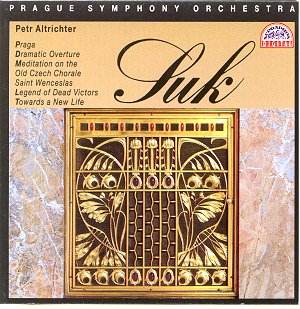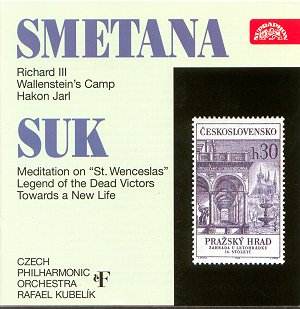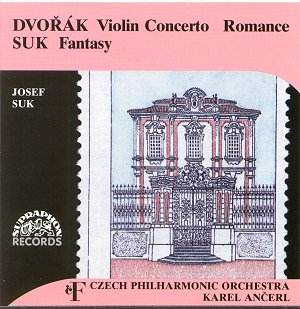JOSEF SUK
(1874-1935)
Praga (1904) 25.09
Dramatic Overture (1892) 12.36
Meditation on Old Czech Chorale - St Wenceslas (1914) 6.53
Legend of Dead Victors (1920) 8.33
Towards a New Life (1919) 5.55
 Prague SO/Petr Altrichter
Prague SO/Petr Altrichter
rec 6-10 June 1992 Prague
 SUPRAPHON 11 1825-2 031
[59.38]
SUPRAPHON 11 1825-2 031
[59.38]

BBC Radio 3 introduced me to many musical experiences. In the early 1970s
there was a broadcast of the LPs of Vaclav Talich conducting the Asrael
Symphony by Josef Suk. I was won over and at some stage I would like
to do a major comparative review of the various versions of that Symphony.
Last year I had the pleasure of hearing Asrael live in Liverpool's
Philharmonic Hall when Libor Pesek conducted the RLPO.
Shortly after taping that 1970s broadcast on an old Philips reel-to-reel
I recall the fiddle of trying to hook up the Philips to a small cassette
recorder so that I could play the symphony in the car. That tape accompanied
me on many a journey from Torquay to the South Hams and to and from Bristol.
Swept away by this grand passionate statement of anger and sorrow and beauty
I was soon chasing after other crocks of Suk gold.
I still have a cassette of a broadcast of Alois Klima conducting the Wenceslas
Meditation and the other two War Triptych pieces.
Determined to review some Suk I have now sought out some rather obscure Supraphon
discs. This is the first one. It is an all-Suk effort. This is not the first
orchestra of the Czech Republic nor is the conductor a name you link with
Suk's or indeed a name you come across that often.
Praga is a work without the creative rigour of Asrael. It is a
grandiloquent piece patriotically portraying the great and beloved city of
Prague. It has a dash of bombast but is loveable enough. Its civic portrayal
might be contrasted with counterpart efforts by Delius (Paris Song of a Great
City) and Elgar (Cockaigne). Altrichter presents it convincingly but cannot
match the finesse of the Pesek version on Virgin and as far as I can recall
this in turn falls short of the same conductor's version on Supraphon (11
1984-2 031).
The Overture, which is not desperately interesting, has less of Beethoven
about it (pace the liner notes) than Tchaikovsky whose Romeo and
Juliet seems to hang unashamedly about the opening bars. Also the strings
seem to be less than subtle or polished for this work. Unsurprisingly
Dvorák is also a voice in this work. Suk was after all a pupil of
Dvorák's.
The last three pieces on the disc are grouped under Op. 35. In one way or
another they are linked with the Great War although the famous
Meditation (possibly a source of inspiration for Barber's
Adagio) dates from the first year of the war. Its orientation is similar
to Vaughan Williams Tallis Fantasia and Nimrod from
Enigma. It is one of the unsung glories of European music of the twentieth
century. Heartfelt and poignantly delving there can be few works with such
perfectly poised emotional and technical balance. The Legend of Dead Victors
commemorates the Czech Legionaries who died in Russia and other European
battlefields in defence of the Czech homeland. Its defiant trumpet figure
(6.53) says it all. The Altrichter performance is good and is in the best
sound available. The old Klima version (never transferred to CD) seems closer
in communion with the searing edge of this music. The gleaming and optimistic
march with its clashing fanfare harmonies is caustically commanding but soon
slides into a military march combining features of a Dvorák furiant
and a Pomp and Circumstance march. The trio is almost Coatesian with a sly
smile and a child's love of the military spectacular.
None of the pieces here is without a personal Suk hallmark. Once you have
fallen for this composer's music you will want all of it. The performances
are respectable and 'catch fire' in the Meditation however nothing to make
you throw your hat in the air.
Decent notes and recording quality.
This disc represents the final instalment in Supraphon's commitment to record
the complete works of Suk.
Rob Barnett

++++++++++++++++++++++++++++++++++++++++++++
BEDRICH SMETANA (1824-1884)
Richard III symphonic poem (1858)
Wallenstein's Camp symphonic poem (1858)
Hakon Jarl symphonic poem (1858)
JOSEF SUK (1874-1935)
Meditation on Old Czech Chorale - St Wenceslas (1914) 8.06
Legend of Dead Victors (1920) 8.20
Towards a New Life (1919) 5.26
 Czech PO/Rafael Kubelik rec
Prague 1943 and 1948 MONO
Czech PO/Rafael Kubelik rec
Prague 1943 and 1948 MONO
 SUPRAPHON SU 1911-2 001
[68.32]
SUPRAPHON SU 1911-2 001
[68.32]

I am afraid that Smetana's trio of tone poems have never been all that
convincing. In this they can be compared with those of Liszt (although I
do have a weakness for Hunnenschlacht and Les Préludes).
They are each shaken with more than a modicum of 'Stürm und Drang' but
memorable themes are in short supply. The hurdy-gurdy violin solo in
Wallenstein's Camp is a notable exception. Otherwise they tend to be rather
ramshackle pieces unredeemed by great themes of the type found by Tchaikovsky
to upholster his symphonic poems. I have not heard them in many a year but
I recall that the 1970s stereo version with Kubelik conducting the Bavarian
Radio SO on DG are to be preferred. It is of great interest to hear how well
Kubelik maintained standards in the very difficult situation of wartime Prague.
Kubelik remained at the head of the Czech Philharmonic throughout the war.
The Suk pieces must have had a special resonance in post-War Czechoslovakia
(and we are talking about 1948!). Kubelik adds a full minute to the timing
of Petr Altrichter's Supraphon version but easily brings it off. At this
pace the links with Gerald Finzi's Introit and Severn Rhapsody
are there to be heard. What a superb work this is! It gives the impression
of a sincere tear-stained enfolding of those wounded in soul and flesh. It
exudes pathos and probes more searchingly than the Altrichter. The Legend
suffers from some uncharacteristic orchestral roughness but finds a depth
of calm missed on Altrichter's stereo version. The March might well have
been known to Arnold Bax at the time when he was writing his Coronation
March 1953 and to Korngold when he wrote the jolly film music for The
Adventures of Robin Hood. Kubelik has plenty of verve and takes the work
with a swing and a swagger.
These are all mono recordings with some slight hiss. If assembled from 78s
(rather than large broadcast discs) the side-joins have been seamlessly
accomplished. The notes are brief.
Rob Barnett

+++++++++++++++++++++++++++++++++++++++++++
ANTONIN DVORÁK (1841-1904)
Violin Concerto (1883)
Romance (1877)
JOSEF SUK (1874-1935)
Fantasy for violin and orchestra (1902)
 Czech Philharmonic Karel
Ancerl
Czech Philharmonic Karel
Ancerl
rec Dvorák 1 Sept 1960 Suk 6 Jan 1965, Prague
 SUPRAPHON SU 1928-2 011
[68.52]
SUPRAPHON SU 1928-2 011
[68.52]

The Dvorák concerto is one of the freshest and most innocent of
inspirations. The themes are distinctive and loveable. In Suk's hands the
Concerto's innocence and lack of affectation are never in doubt and in this
he is aided by the most sympathetic of partners. In the central movement
Suk and the orchestra bring out the connections with the Beethoven concerto.
There have been quite a few recordings of the concerto issued during the
1980s and 1990s although few seem to have held for long in the catalogue.
This Supraphon was recorded at a time when there were either none or very
few alternatives. Those who bought those old Supraphon LPs were treated to
an apt and engaging performance of a radiant work of innocent Czech nationalism.
The Romance (extracted from an unpublished string quartet) is equally beguiling
- no torment, no angst, just a gracious line.
The single movement Suk work performed by his namesake moves us on to more
passionate territory. The opening is vehemently tempestuous. Offhand I cannot
think of any alternative versions of the Suk apart from one I seem to recall
on Koch International. This is likely to appeal to anyone who loves their
Suk but also to others who appreciate the Delius and Bax violin concertos
and even Bruch's Scottish Fantasia. It is a stronger work than either piece.
Ida Haendel would have been a superb soloist for the Suk. What a pity that
she never recorded it. Suk is another such who handles the full-blooded passion
of the piece as well as the romantic delicacy. The work, once or twice, tips
over into Richard Strauss territory but this does nothing to harm the work.
This overlooked work is another victim of a composer's failure to call a
work a concerto.
Despite recordings now between 35 and 40 years old the stereo sound is a
respectable advocate for these works and their interpretations.
A treasury disc. Snap it up if you see it. It used to be fashionable at one
time for critics to look down their noses at Supraphon products. I hope those
days are left way behind us. This disc helps bury the old generalisations.
Rob Barnett

